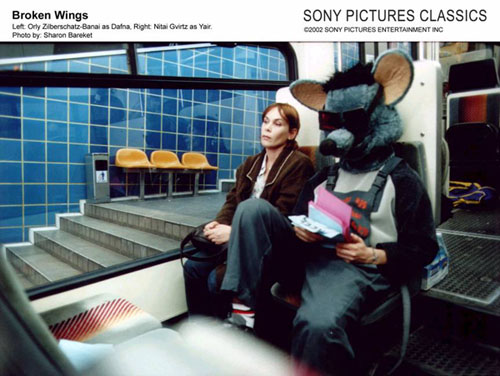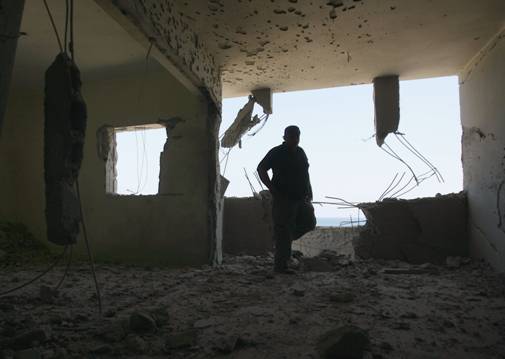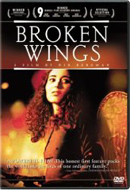
This “Really Good Films” interview
with director and screenwriter
NIR BERGMAN
was originally posted on March 12, 2004.
FF2 thanks RGF for permission to post.
______________________________
Jan Chats with Nir Bergman
about
BROKEN WINGS
(Hebrew Title: KNAFAYIM SHVUROT)

“Who says life in Haifa ends at 10 PM?”
The Israeli film BROKEN
WINGS swept that country's Academy Awards in 2002, and also won major awards at the Berlin, Palm Springs and Tokyo International film festivals. The film opens this week in the United States. Jan Lisa Huttner
(JLH) caught up with director Nir Bergman in Chicago to discuss some of the metaphors that inform the film.
JLH: When
BROKEN WINGS begins, a mother and her four children are in mourning. The father is dead, but we don't see any pictures of him, or any flashbacks that tell us who he is. I think "the father" is Yitzhak Rabin [the Israeli Prime Minister who was assassinated by a right-wing Jewish zealot in 1995]. Am I wrong about this?
Nir Bergman:
No, no, you are not wrong at all. In a lot of ways this film is personal to me. It came from personal materials (about my parents divorce). But in the process of making the film, it became clear that this family can give you a picture of our world today. Since this murder, Israel is an orphaned country. Rabin's death influenced me very strongly.
JLH:
Unfortunately, most Americans have forgotten about Yitzhak Rabin. They've forgotten about how hopeful we all were when President Clinton brought Arafat and Rabin together and they shook hands on the White House lawn.
Nir Bergman:
In Israel, when Rabin was murdered, we didn't have a father figure anymore, and it split the country into pieces, like the Ullman family is split in my film. When someone dies, you think that people will join together. But many times it's not like that. Sometimes people draw away from each other. And our country [Israel] is now split. In a way, it's hard for us to say the word "us" anymore.
Just like the Ullman family, we are a small country trying to survive, trying to have a normal day, trying to get back to normality. In the first scene that I wrote for the script, before I knew what the whole script would be about, a family lost their dog on the day that Rabin was murdered. Eventually, that scene just got dropped. The script was going different places. But that was the first scene.
JLH:
In the film, one of the daughters, Maya, tells someone that her father died from a bee sting, and the woman says: "Didn't he know he was allergic?" And Maya says: "Yes, he knew."
Nir Bergman:
And then you carry this guilt, but you're not guilty. When the woman asks her: "So, what happened?" Maya is just quiet. She doesn't know. She doesn't know why it happened. It's like something from the sky, you know. We don't know why it happened. It's just like that! (snaps his fingers).
JLH:
BROKEN WINGS isn't directly related to terrorism or war, but still, the constant vigilance of daily life in Israel comes through. How did you capture that feeling?
Nir Bergman:
People tell me this film could happen anywhere. When we were in Japan, people said, "Hey, it could happen here." In Germany, they said, "It could happen here." In the States, they say, "It can happen anywhere."
So it's not the story but the way it's told that makes it so Israeli. You always worry about the people in this family, you know. You just see a girl and she's riding her bicycle, going down a hill, and you worry. You think: "What's going to happen?" All the time it's like that. Constant edginess. This edginess is in the characters, but it's in the country as well, because we live closer to death in Israel. It's always there.
JLH:
Sudden death.
Nir Bergman:
Sudden death, yes. Actually it's here right now in the States and everywhere else, but most of the people who live here don't feel how close it is. But in Israel, we feel it.
JLH:
Is this connected somehow to the mouse costume worn by the son Yair?
Nir Bergman:
He carries this thing with him everywhere: sudden death. He doesn't understand what grown-ups do anymore. He doesn't understand why he has to go to school anymore when he has so few years to spend on this planet. He thinks people are like mice now, because they just live to die. It doesn't matter if you live seventy years; seventy years is nothing compared to the universe of time.
JLH:
Why mice? Is this a reference to Art Spiegelman's book MAUS?
Nir Bergman:
No, that's just a coincidence. Yair was in a mask in every draft of my script. He has to defend himself from reality. While I was writing, I scouted locations in Haifa, the city I grew up in. When I decided he was going to work in the subway, in a tunnel, Yair became a mouse.
JLH:
What does it say on the front of his costume?
Nir Bergman: "Who says that life in Haifa stops at 10:00 p.m.?"
© Jan Lisa Huttner (3/12/04)
FF2 ADDENDA
“Who says that life in Haifa stops at 10:00 p.m.?"

Hezbollah Attacks Reach Deep Into Israel
HAIFA, ISRAEL - JULY 19: An Israeli man stands in a damaged house
after a Hezbollah missile strike on July 19, 2006 in Haifa, Israel.
Haifa was struck again by rockets fired from Lebanon on Wednesday,
causing several minor injuries, witnesses and medics said.
At least 13 Israeli civilians have been killed by Hezbollah rocket attacks
in the recent conflict. (Photo by Uriel Sinai/Getty Images/NewsCom)
New Thoughts after a War-torn Summer:
When I first saw these words (in Hebrew) emblazoned on Yair’s mouse costume, I was struck by Bergman’s brilliant black humor. Yes, terrorists are developing the ability to strike anywhere they choose, but Haifa itself is just another small city, relatively comfortable & a bit on the dull side.
We now know that was an illusion. Day after day, as Haifa was bombarded by Hezbollah rockets, Yair’s question took on increasingly tragic overtones, & those of us still mourning Yitzhak Rabin’s assassination were left wondering what would be different now if he had lived.
Nir Bergman is a great filmmaker. In BROKEN WINGS, he created a resonant work of art born right at the edge of its time. Bravo!
© Jan Lisa Huttner (8/27/06)
Follow this link to
read Jan’s review of BROKEN WINGS
for the WORLD JEWISH DIGEST.
|

|
Now available on
DVD,
BROKEN WINGS won awards from audiences
& critics all around the world, including the following: |
|
Awards of the Israeli Film Academy |
| Year |
Result |
Award |
Category/Recipient(s) |
|
2002 |
WON |
Israeli Film Academy |
Best Actress:
Orly Silbersatz Banai |
Best Art Direction:
Ido Dolev |
Best Cinematography:
Valentin Belonogov |
Best Director:
Nir Bergman |
Best Editing:
Einat Glaser-Zarhin |
|
Best Film |
Best Screenplay:
Nir Bergman |
Best Sound:
David Liss + Gil Toren |
Best Supporting Actress:
Maya Maron |
| Nominated |
Israeli Film Academy |
Best Costume Design:
Ada Levin |
Best Supporting Actor:
Nitai Gaviratz |
|
Berlin International Film Festival |
| Year |
Result |
Award |
Category/Recipient(s) |
| 2003 |
WON |
C.I.C.A.E. Award |
Nir Bergman |
| Panorama Audience Award |
Nir Bergman |
| Ecumenical Jury Prize |
Nir Bergman |
|
Jerusalem Film Festival |
| Year |
Result |
Award |
Category/Recipient(s) |
| 2002 |
WON |
Wolgin Award:
Best Israeli Feature |
Nir Bergman |
|
Palm Springs International Film Festival |
| Year |
Result |
Award |
Category/Recipient(s) |
| 2003 |
WON |
John Schlesinger Award |
Nir Bergman |
|
Tokyo International Film Festival |
| Year |
Result |
Award |
Category/Recipient(s) |
| 2002 |
WON |
Tokyo Grand Prix |
Nir Bergman |
